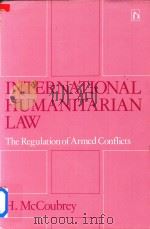《THE“CONFLICTS”PROCESS》
| 作者 | DAVID C.JACKSON 编者 |
|---|---|
| 出版 | THE BRITISH INSTITUTE OF INTERNATIONAL |
| 参考页数 | 408 |
| 出版时间 | 1975(求助前请核对) 目录预览 |
| ISBN号 | 0379003821 — 求助条款 |
| PDF编号 | 813695758(仅供预览,未存储实际文件) |
| 求助格式 | 扫描PDF(若分多册发行,每次仅能受理1册) |
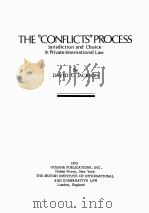
PART Ⅰ THE PROCESS, ITS PURPOSE PRINCIPLES AND WORKING1
CHAPTER 1 LEGAL SYSTEMS, RULES AND ISSUES - THE CONTACT POINTS1
1. The limitation of forum power1
A. Relevance of contact points3
(ⅰ) Forum power to adjudicate3
(ⅱ) Application of foreign rules by forum3
(ⅲ) Recognition of foreign adjudications4
B. Contact before content5
2. A threefold process - primary divisions?6
The "content11 approach8
CHAPTER 2 PRINCIPLES OF REFERENCE14
1. Selection criteria17
A. The connecting links18
(ⅰ) The flcontact-interestf? principle18
(ⅱ) The "content11 or "policy" interest rinciple19
(ⅲ) Contact between rule and issue21
B. The place of the forum22
2. Rule manipulation - the operation of judiciaL discretion23
A. Judicial role of discretion23
B. Discretion as part of the conflicts process25
3. The English process and the criticisms25
CHAPTER 3 THE PROCESS AND ITS WORKING32
1. Judicial approaches32
A. The power to adjudicate34
B. The rule governing the adjudication35
The English approach - Chaplin v. Boys35
2. The approaches identified39
A. One "interested" state39
B. A choice between "interested" states41
3. The nature of the process45
A, The conflicts and domestic processes compared45
Discretion and rule46
B. The value of the approaches48
4. The English process - the questions posed50
CHAPTER 4 "TRUE" AND "FALSE" CONFLICTS57
1. Categories of false conflicts59
A. Identity of domestic rules59
B. Applicability of one rule62
(ⅰ) Sole interest62
(ⅱ)"No interest"63
C. The purposes of choice63
2, The role of the selective process64
PART Ⅱ SELECTION PRINCIPLES - RULES AND DISCRETION69
CHAPTER 5 CLASSIFICATION AND LEGAL CATEGORIES72
1. The relevance of the legal category72
A. Categories with defective basis74
B. Inappropriate use of categories74
C. Categories in the "conflicts" sphere75
2. Domestic creation and use of categories75
A. Personal/real76
B. Contract/tort76
C. Restitution78
D."Proprietary interest1179
E. General use and purpose in domestic sphere80
3. Creation and use of "conflicts'1 categories82
CHAPTER 6 "CONFLICTS" CLASSIFICATION89
1. Classification at work89
A. Type of issue89
B. Type of interest at issue92
C. Need to classify a specific issue93
Independent reference?96
2. Nature of classification98
A, Categories of "liability" as connecting links99
B. The "categories" as non-exclusive selection criteria99
3. According to which legal system should an issue be classified?101
A. Initial classification102
B. Secondary or "double" classification105
4. Avoidance of present categories - reference of specific issue110
The nature of the "specific issue"111
CHAPTER 7 FORUM JURISDICTION - CONTACTS AND CATEGORIES127
1. Jurisdictional contact points127
A. Control127
Actions relating to foreign land128
(a) Limitations on the limitation130
(b) Need for a personal obligation133
(c) The Mocambique rule and domestic concepts134
B. Contact points other than control135
(ⅰ) Status issues135
(ⅱ) Non status issues136
(ⅲ) Agreement136
2. Jurisdictional categories137
A. Conflicts categories138
(ⅰ) Status/non status138
(ⅱ) Immovable/movable139
B. Adoption of domestic categories141
(ⅰ) In rem/in personam141
(ⅱ) Domestic divisions within the "status" and "non status" categories144
(ⅲ) Imposition of forum control through domestic categories145
(ⅳ) Confusion between jurisdiction and choice of law caused by use of domestic categories146
3. Qualification on the category/contact approach148
CHAPTER 8 FOREIGN JURISDICTION - CONTACTS AND CATEGORIES164
1. Contacts165
2. Categories167
Conflicts and domestic categories167
(ⅰ) Status/non status167
(ⅱ) Immovable/movable167
(ⅲ) In rem/in personam168
3. General qualifications on the category/contact approach171
CHAPTER 9 THE RESOLUTION OF ISSUES (CONTACTS AND CATEGORIES)179
1. The contacts179
A. The place of the proceedings179
(ⅰ) Procedural matters179
(ⅱ) Tort179
B. Substantial connection180
(ⅰ) Status180
(ⅱ) Non status180
C. The place of the event or thing181
(ⅰ) Tort182
(ⅱ) Property184
2. The categories185
A. A preliminary division185
Substance/procedure185
B. Major matter categories187
(ⅰ) Status187
(ⅱ) Non status188
(a) A conflict category188
Immovable/movable188
(b) Adoption of domestic categories189
ⅰ.Consequences of generalisation189
ⅱ.Specific categories193
Contract193
Tort194
Classification of the sub-stantive issue195
The nature of foreign "liability"196
Property198
Is it a proprietary or "title" issue?198
Nature of "thing at issue"199
The movable/immovable categories200
Restitution201
C. Divisions within the "subject matter" categories201
3. The contact/category approach202
CHAPTER 10 SECONDARY SELECTION RULES212
1. Foreign selection of governing rules213
2. Ancillary issues or "incidental" questions216
A. The power to adjudicate217
B. The rule governing the dispute218
PART Ⅲ SELECTION QUALIFICATIONS230
CHAPTER 11 THE APPROPRIATE FORUM230
1. Abuse of process - "oppressive or vexatious" proceedings231
2. Assertion of the power to adjudicate234
3. Forum shopping236
4. The established operation of "appropriateness"237
A. The upbringing of children238
B. Equitable proceedings240
C. "Exhorbitant" jurisdiction - (the "long arm")241
(ⅰ) The discretionary power241
(ⅱ) The exercise of the discretion244
5. Introduction of a general principle?247
6. Effect of forum selection by agreement254
CHAPTER 12 EFFECTIVENESS OF THE COURTS ORDER270
1. A jurisdictional prerequisite?271
2. Exercise of the power to adjudicate272
PART Ⅳ POLICY AND DISCRETION279
CHAPTER 13 "POLICY" IN THE PROCESS279
1. The role of forum policy279
A. The application of a forum dispositive rule280
B. The category approach280
C. Forum self selection281
D. Presumption of "Englishness"281
E. Refusal to apply foreign rule282
2. The need to specify the applicable "policy" ground283
3. Interrelation of policy and rule284
A. Distinction between status and consequence286
B. A "penal" status286
4. Policy and rule - The English judicial approach287
A. The National Bank of Greece cases287
(ⅰ) The fact situations and the judgments287
(ⅱ) The conflicts framework and the cases292
(ⅲ) The Metliss case292
(a) Liability apart from the moratorium292
(b) The effect of the moratorium294
(c) Interrelation of the two issues294
(ⅳ) The Adams case295
B. Policy, classification and facing the issue297
CHAPTER 14 THE ROLE OF JUDICIAL DISCRETION304
1. The forum power to adjudicate304
2. Recognition of foreign adjudication307
CHAPTER 15 THE ROLE OF THE FORUM312
1. The application of a forum rule314
A. By reason of the forum dispositive rule314
B. Through attachment of forum law to forumcategories316
(ⅰ) Tort316
(ⅱ) Procedure321
2. The application of forum rules through classification321
3. Equation of English and foreign rules326
A. Methods of proof of foreign law329
B. Non discovery of the content of foreign rule332
4. Rejection of the selected foreign rule334
A. The relevance of contact points335
B. The development of rules from "policy" rejection335
C. A return to undefined rejection?338
D. Specific grounds for rejection340
E. The need to specify relevant contacts and content341
PART Ⅴ THE FUTURE357
CHAPTER 16 THE PRESENT PROCESS AND ITS DEVELOPMENT357
1. Essential elements of the process - a summary357
2. The present process359
A. Forum power to adjudicate359
(ⅰ) Contact points360
(ⅱ) The appropriate forum361
B. Foreign power to adjudicate362
C. The resolution of disputes362
Chaplin v. Boys - a lament363
D. The general approach366
CHAPTER 17 INTEREST THROUGH CONTACT370
1. Contact points370
2. The place of the forum370
3. Forum and foreign power to adjudicate371
A. The power of the English court371
B. Recognition by an English court of foreign court power372
4. The resolution of disputes372
A. The relevance of a federal system373
B. The suggestions compared373
(ⅰ) Category classification373
(ⅱ) Connecting factors - contact and content374
C. The two stage process375
D. Interrelation of "contact" and "content"376
5. Forum's overriding power382
6. The need for "contact"382
7. Conclusion387
Index399
1975《THE“CONFLICTS”PROCESS》由于是年代较久的资料都绝版了,几乎不可能购买到实物。如果大家为了学习确实需要,可向博主求助其电子版PDF文件(由DAVID C.JACKSON 1975 THE BRITISH INSTITUTE OF INTERNATIONAL 出版的版本) 。对合法合规的求助,我会当即受理并将下载地址发送给你。
高度相关资料
-

- The challenges of wealth : mastering the personal and financial conflicts
- 1988 Dow Jones-Irwin
-
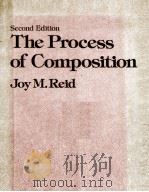
- THE PROCESS OF COMPOSITION
- 1988 PRENTICE HALL
-

- PFLANZENATMUNG
- 1924 VERLAG VON JULIUS SPRINGER
-

- The Struggle for Recognition The Moral Grammar of Social Conflicts
- 1995 The MIT Press
-

- INTERDEPENDENCE AND CONFLICTS IN THE WORLD ECONOMY
- 1981 SIJTHOFF & NOORDHOFF
-

- The Chilean political process
- 1989 Westview Press
-

- THE CHANGING OUTPLACEMENT PROCESS
- 1994 QUORUM BOOKS
-

- THE NEGOTIATION PROCESS AND THE RESOLUTION OF INTERNATIONAL CONFLICTS
- 1998 UNIVERSITY OF SOUTH CAROLINA PRESS
-
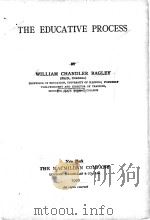
- THE EDUCATIVE PROCESS
- 1920 THE MACMILLAN COMPANY
-
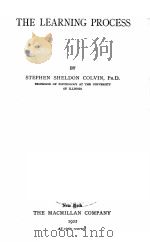
- THE LEARNING PROCESS
- 1922 THE MACMILLAN COMPANY
-

- THE AGE OF THE ARCTIC:HOT CONFLICTS AND COLD REALITIES
- 1989 CAMBRIDGE UNIVERSITY PRESS
-
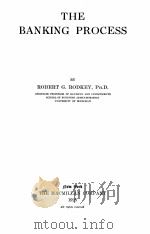
- THE BANKING PROCESS
- 1928 THE MACMILLAN COMPANY
提示:百度云已更名为百度网盘(百度盘),天翼云盘、微盘下载地址……暂未提供。➥ PDF文字可复制化或转WORD


